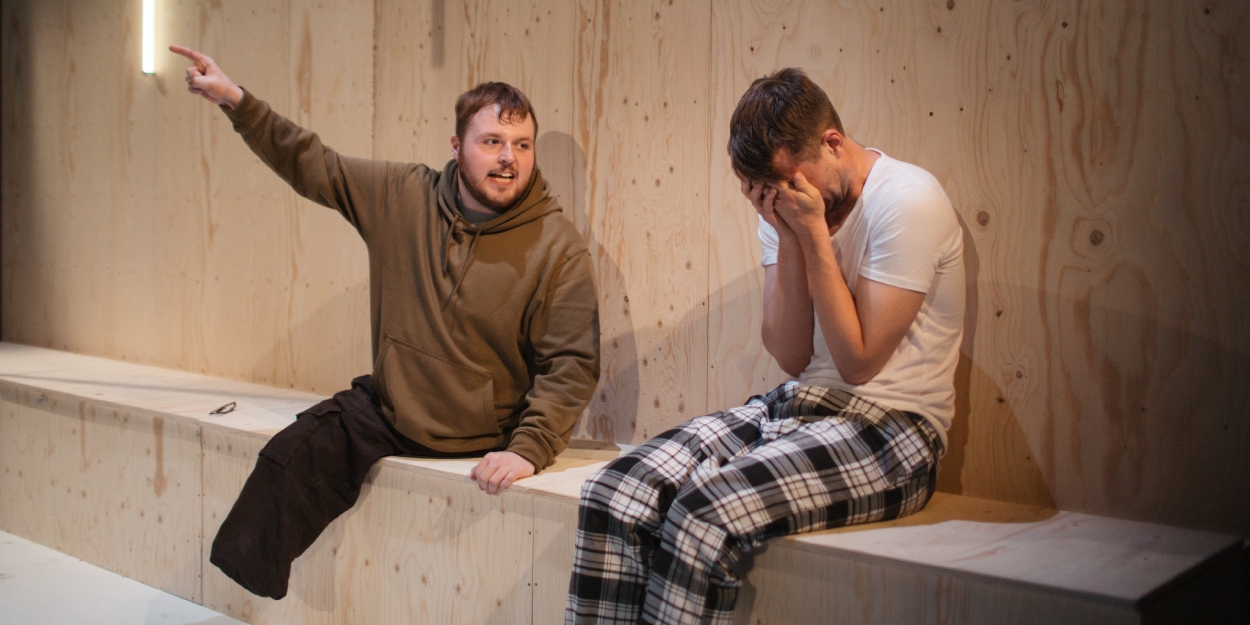Review: PAPER CUT, Park Theatre
The story of a wounded gay army veteran that says nothing about the US political climate or the context it fits into.

![]() Kyle has just returned to the States from Afghanistan. An American soldier who would do anything for his country, he was injured in a blast, losing both his legs and then some. Stripped of his pride, his job, and his manhood, he is the shell of a man.
Kyle has just returned to the States from Afghanistan. An American soldier who would do anything for his country, he was injured in a blast, losing both his legs and then some. Stripped of his pride, his job, and his manhood, he is the shell of a man.
Andrew Rosendorf follows him as he adjusts to a life of disability and comes to terms with his sexuality. The writer does a disservice to both characters and context. The distinctive lack of exploration of the themes he wants to engage with is frankly baffling. The framework in which Kyle’s accident takes place and the immediate ramifications and repercussions of the political climate and government shortcomings are as neglected as the protagonist’s mental health.
Closeted and ashamed of his sexual orientation, we see Kyle struggling to accept his attraction to Chuck in a series of flashbacks of his deployment. The unfortunate dearth of chemistry between Callum Mardy (Kyle) and Prince Kundai (Chuck) doesn’t aid the mission and results in awkward personal contact and creaky tension. More interesting than their story, which is relatively stocky and predictable, is the context in which it happens, though it remains rather unaddressed.
The unavoidable political identity of the play is left to its own devices and almost unmentioned even though the inadequacy of the support from the administration permeates every second of it. The big bad wolf isn’t The Taliban which placed the bomb or the freshly killed Osama bin Laden here, but the US Army who’s leaving Kyle to rot in a motel after his rehab. It’s a shame this side of the subject is unnurtured.
Rosendorf introduces Kyle as a patriot, the model trooper who’d die for a country that’s failing him. His blind faith is milked in a practically propagandistic way at times, with Mardy straightening up in his seat and delivering a pledge of sorts while everything else around him is in ruins. His journey is oblivious to the contextual neglect of veterans like him, with Rosendorf focusing on his relationships only.
Under Scott Hurran’s direction, Paper Cut is paceless as well as meaningless. If there’s one thing we take away is that therapy should be more available. Kyle’s PTSD goes hand in hand with his and his brother’s family trauma and cravings of self-destruction (mental, emotional, physical), as these stories usually go. A homophobic, violent father and a mother who died of cancer pepper the resentment between the two.
While Kyle romanticises “the sacrifice” army soldiers make, we learn that he outed his twin to his dad out of fear he’d find out he was also a homosexual. They’re both embittered and traumatised by the events, which ripple through but are not spun in any meaningful way. The spikes of tension in an otherwise lethargic production are kick-started by Chris Warner’s sound design, which reinvigorates the pace and revives the rhythm momentarily. The attempts at hard-hitting drama fall short in eloquence, as do some of the more humorous exchanges. Hurran directs a mixed bag of acting quality that ambles between forced sentimentalism and cued nervous outbursts.
Mardy scowls endlessly between fits of rage and self-pity. Angry, emasculated, and on his guard at all times, the soldier is sadly one-dimensional and standardised. He complains of the commercialisation of the Ground Zero memorial and glorifies his role to ridiculous levels, constantly risking nationalism. Like those near him (and perhaps the writer himself), he can’t see his real tragedy. Failed by the military, the medical system, and a society that revolves around toxic masculinity and sex, they all blame fate and The Taliban instead. On the other end of the personality spectrum, we find Harry, Kyle’s high school mate, played by Heartstopper’s Tobie Donovan as an overly jolly, bumbling lad who’s had a crush on Kyle since his teens but isn't ready to accept the consequences of his injuries.
Kundai gives the best performance of the night alongside Joe Bolland, who is stifled by some of the directions in the text. They all play into Kyle’s alienation and disconnect from the world outside of the war-zone, highlighting the deep emotional impairment of the protagonist, the lack of communication between them, and the continuous rejection of any kind of vulnerability or weakness.
Ultimately, the piece is careless about its implications and short-sighted in its reach. It doesn’t really say much about the bigger picture nor about the incidental political statements it makes. It’s not a lost cause, but - just like Kyle does - it deserves more attention.
Paper Cut runs at the Park Theatre until 1 July.
Photo credit: Stefan Hanegraaf
Reader Reviews
Videos

